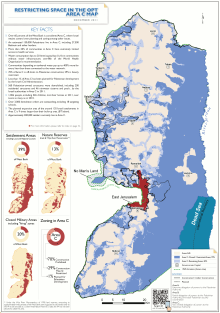منطقه ج (کرانه باختری)
منطقه ج (عبری: שטח C؛ عربی: منطقة ج) قلمرویی تحت اشغال اسرائیل و تنها سرزمین همجوار در کرانه باختری است که بهعنوان منطقه کاملاً خارج از مناطق تحت کنترل فلسطین (مناطق الف و ب) تعریف میشود.[۱] منطقه ج، حدود ۶۱ درصد از سرزمینهای کرانه باختری را تشکیل میدهد که شامل تمام شهرکهای اسرائیلی به غیر از شهرکهای اورشلیم شرقی است و ورود به بیش از ۹۹ درصد این منطقه، برای فلسطینیها ممنوع یا به شدت محدود شده است.[۲][۳] این منطقه در سال ۱۹۹۵، بر پایه پیمان اسلو ۲ مقرر شد که به تدریج به حوزه قضایی فلسطین منتقل شود (با گزینهای برای مبادله زمین بر اساس توافق نهایی)، اما چنین انتقالی اتفاق نیفتاد.[۴] این منطقه، دارای منابع طبیعی غنی است.[۳]

منطقه ج (به جز اورشلیم شرقی) که به همراه منطقه ب، از ژوئن ۱۹۶۷ تحت کنترل نظامی اسرائیل است، تقریباً ۴۰۰۰۰۰ شهرکنشین اسرائیلی[۵] و تقریباً ۳۰۰۰۰۰ فلسطینی را در خود جای داده است که در بیش از ۵۰۰ منطقه[۶] واقع در منطقه ج زندگی میکنند که مستقیماً توسط هماهنگکننده فعالیتهای دولتی اسرائیل، در مناطق تحت قوانین نظامی اداره میشود. تشکیلات خودگردان فلسطین، مسئول خدمات پزشکی و آموزشی به فلسطینیان در منطقه ج است اما ساخت زیرساخت و نظارت توسط اسرائیل انجام میشود.[۷]
جامعه بینالمللی، شهرکسازی در سرزمینهای اشغالی را غیرقانونی میداند،[۸][۹][۱۰][۱۱] و سازمان ملل، بارها این دیدگاه را تأیید کرده است که شهرکسازی توسط اسرائیل، نقض قوانین است. در کنوانسیون چهارم ژنو،[۱۲][۱۳] اسرائیل، موضع جامعه بینالمللی و استدلالهای قانونیای را که برای اعلام غیرقانونی بودن شهرکها مورد استفاده قرار گرفت را مورد مناقشه قرار داد.[۱۴][۱۵]
منابع
ویرایش- ↑ In the definition of West Bank Areas in the Oslo II Accord it is defined as "areas of the West Bank outside Areas A and B".
- ↑ The demise of the Oslo process. Joel Beinin, MERIP, 26 March 1999. "In area B, consisting of about 23 percent of the territory (including some 440 villages and their surrounding lands), the Palestinians are responsible for certain municipal functions, while joint Israeli-Palestinian patrols maintain internal security. Area C, consisting of about 74 percent of the territory including all of the 145 settlements and the new Jewish neighborhoods in and around East Jerusalem, remains under full Israeli control".
- ↑ ۳٫۰ ۳٫۱ خطای یادکرد: خطای یادکرد:برچسب
<ref> غیرمجاز؛ متنی برای یادکردهای با نامWorld Bankوارد نشده است. (صفحهٔ راهنما را مطالعه کنید.). - ↑ "Area C and the future of Palestinian economy" (PDF). World Bank. Retrieved 7 September 2015.
- ↑ "Localities and Population, by Population Group, District, Sub-District and Natural Region". Israel Central Bureau of Statistics. 2016. Retrieved 4 September 2016.
- ↑ Hass, Amira (5 March 2014). "UN Report: 300,000 Palestinians Live in Area C of West Bank". Haaretz. Retrieved 27 April 2017.
- ↑ "Acting the Landlord: Israel's policy in Area C, the West Bank" (PDF). B'Tselem. Retrieved 7 September 2015.
- ↑ Roberts, Adam (1990). "Prolonged Military Occupation: The Israeli-Occupied Territories Since 1967". The American Journal of International Law. American Society of International Law. 84 (1): 85–86. doi:10.2307/2203016. JSTOR 2203016.
The international community has taken a critical view of both deportations and settlements as being contrary to international law. General Assembly resolutions have condemned the deportations since 1969, and have done so by overwhelming majorities in recent years. Likewise, they have consistently deplored the establishment of settlements, and have done so by overwhelming majorities throughout the period (since the end of 1976) of the rapid expansion in their numbers. The Security Council has also been critical of deportations and settlements; and other bodies have viewed them as an obstacle to peace, and illegal under international law.
- ↑ Barak-Erez, Daphne (2006). "Israel: The security barrier—between international law, constitutional law, and domestic judicial review". International Journal of Constitutional Law. Oxford University Press. 4 (3): 548. doi:10.1093/icon/mol021.
The real controversy hovering over all the litigation on the security barrier concerns the fate of the Israeli settlements in the occupied territories. Since 1967, Israel has allowed and even encouraged its citizens to live in the new settlements established in the territories, motivated by religious and national sentiments attached to the history of the Jewish nation in the land of Israel. This policy has also been justified in terms of security interests, taking into consideration the dangerous geographic circumstances of Israel before 1967 (where Israeli areas on the Mediterranean coast were potentially threatened by Jordanian control of the West Bank ridge). The international community, for its part, has viewed this policy as patently illegal, based on the provisions of the Fourth Geneva Convention that prohibit moving populations to or from territories under occupation.
- ↑ International Labour Organization (2005). "The situation of workers of the occupied Arab territories" (PDF). p. 14.
The international community considers Israeli settlements within the occupied territories illegal and in breach of, inter alia, United Nations Security Council resolution 465 of 1 March 1980 calling on Israel "to dismantle the existing settlements and in particular to cease, on an urgent basis, the establishment, construction and planning of settlements in the Arab territories occupied since 1967, including Jerusalem".
- ↑ Civilian and military presence as strategies of territorial control: The Arab-Israel conflict, David Newman, Political Geography Quarterly Volume 8, Issue 3, July 1989, Pages 215–227
- ↑ "UN Security Council Resolution 465". Archived from the original on 19 September 2015.
- ↑ "What next for Gaza and West Bank?". BBC. 30 August 2005. Retrieved 5 January 2010.
Most Israelis support the pullout, but some feel the government has given in to Palestinian militant groups, and worry that further withdrawals will follow. Palestinian critics point out that Gaza will remain under Israeli control, and that they are being denied a political say in the disengagement process.
- ↑ "Israel, the Conflict and Peace: Answers to frequently asked questions". Israel Ministry of Foreign Affairs. November 2007.
Are Israeli settlements legal?
- ↑ "Under Threat: Demolition orders in Area C of the West Bank" (PDF). United Nations. Archived from the original (PDF) on 22 November 2015. Retrieved 7 September 2015.